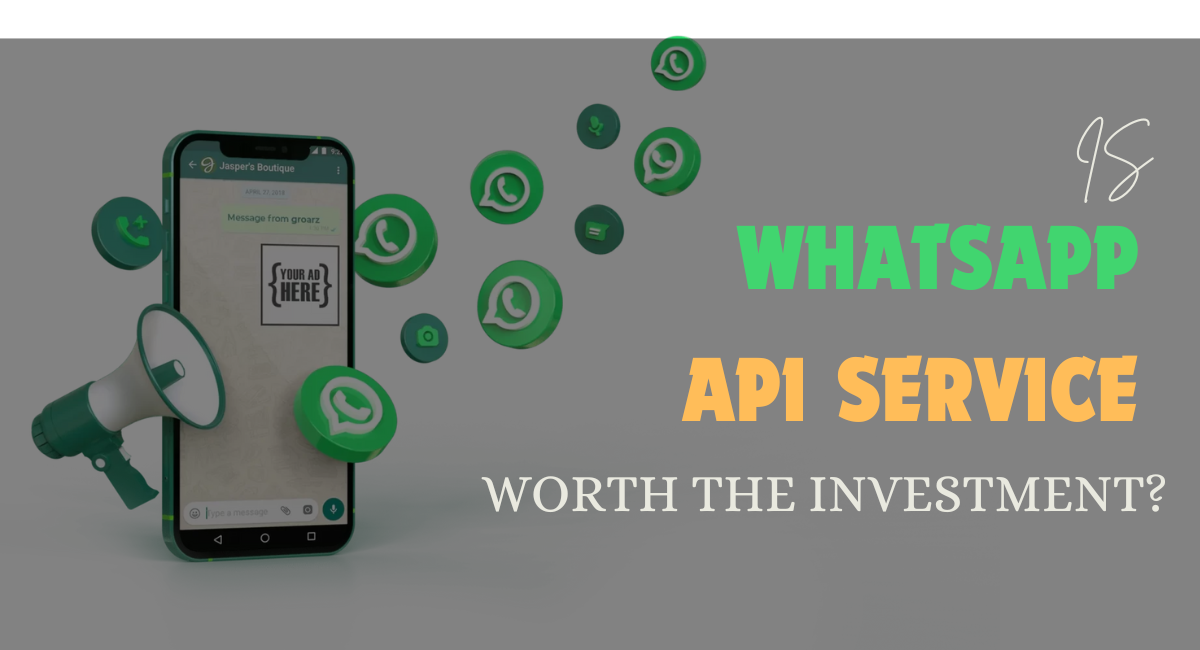In today’s digital age, where communication channels are key to successful marketing, WhatsApp has emerged as a dominant platform.
With over 2 billion active users globally, it’s clear that WhatsApp is not just a messaging app but a powerful tool for businesses to connect with their customers.
One question that often arises is: Is investing in WhatsApp Bulk Message API service really worth it? Let’s break this down.
What is WhatsApp Bulk Message API?
WhatsApp Bulk Message API allows businesses to send automated, bulk messages to a large number of users. These messages could be promotional, transactional, or even notifications about your services. Whether you run an e-commerce store, provide services, or manage a customer support team, WhatsApp API can streamline your communication efforts.
However, before jumping in and investing, it’s crucial to weigh the pros and cons of the service.
Why Consider WhatsApp Bulk Message API?
The idea of directly reaching out to a massive audience via their most personal communication tool—WhatsApp—seems highly appealing. But is this method truly effective? Here’s why we believe it is:
- Wider Reach:
WhatsApp’s global presence ensures that your message has a broader reach compared to traditional SMS or email marketing. - Higher Engagement Rates:
Messages sent via WhatsApp generally have a high open rate, often up to 98%. This significantly increases the chances of your content being seen. - Cost-Effective Communication:
When compared to other forms of bulk messaging like SMS or email marketing, WhatsApp offers a more cost-efficient way to engage with your audience. - Personalised Messaging:
The API allows you to create personalised messages for each customer, which can significantly improve customer engagement. - Real-Time Support:
With features like quick replies and bots, you can provide instant customer support, enhancing user experience. - Rich Media Support:
Unlike traditional SMS, WhatsApp lets you send images, videos, documents, and even location data. This allows you to deliver more interactive and engaging messages.
Is It Worth the Investment?
Now that we’ve looked at the pros and cons, the big question remains: Is WhatsApp Bulk Message API worth your investment? Let’s break it down based on several factors:
- Customer Reach and Engagement
The ability to reach billions of users directly in their messaging app is a game-changer. If customer engagement is a priority for your business, WhatsApp Bulk Message API is undoubtedly a great tool. Higher open and interaction rates mean more opportunities for customer retention. - Business Type and Audience
If your business relies heavily on real-time updates, notifications, or transactional messages, WhatsApp API can be a crucial addition to your communication strategy. For industries like e-commerce, logistics, and customer service, the API provides a competitive advantage. - Cost vs. Benefit Analysis
While there are costs involved, the high engagement rates and direct customer interaction often offset these expenses. Additionally, the rich media support and personalised messages contribute to a better user experience, which ultimately drives more conversions. - Brand Image
Sending personalised messages via WhatsApp helps build a more direct and trustworthy relationship with your customers. This not only elevates customer satisfaction but also enhances brand loyalty over time.
Key Use Cases for WhatsApp Bulk Message API
To truly understand whether this service is worth the investment, let’s look at some real-world applications where WhatsApp Bulk Messaging excels.
- E-Commerce:
Send order confirmations, shipment updates, and promotional offers to customers in real-time. - Healthcare:
Appointment reminders, prescription updates, and health check-up promotions can be shared directly with patients. - Education:
Keep students and parents informed about important dates, results, and announcements. - Travel and Hospitality:
Send booking confirmations, travel itineraries, and post-trip surveys via WhatsApp to enhance the customer experience.
What to Look for When Choosing a WhatsApp Bulk Message API Service?
If you’ve decided that WhatsApp Bulk Messaging API is right for your business, the next step is choosing the right service provider. Here’s what to look for:
- Compliance with WhatsApp’s Policies:
Ensure the service provider follows all WhatsApp guidelines to avoid getting blocked. - User-Friendly Interface:
A good service should offer an intuitive platform that doesn’t require deep technical knowledge. - Personalisation Options:
The ability to segment your audience and send personalised messages is crucial for improving engagement. - Analytics and Reporting:
Look for services that offer detailed insights and performance reports to track the success of your campaigns. - Customer Support:
Since you might encounter technical issues during integration, a service provider with excellent customer support will be invaluable.
How to Maximise ROI from WhatsApp Bulk Message API
To ensure you’re getting the most out of your investment, here are a few strategies we recommend:
- Segment Your Audience:
Not every message is relevant to every customer. Segment your audience to ensure you’re sending relevant messages, which will improve your response rates. - Focus on Timing:
Timing is everything. Analyse the optimal time to send messages for your audience and industry to get the best response. - Monitor Engagement:
Regularly check the performance of your campaigns and adjust your strategies based on what works best. - Integrate with Other Platforms:
Combine WhatsApp API with your other marketing channels like email, social media, or website to create a cohesive strategy.
Investing in WhatsApp Bulk Message API can be a strategic move for businesses looking to improve customer engagement, build trust, and offer a more personalised communication experience. However, like any marketing tool, it’s essential to understand your audience, follow best practices, and continuously monitor the effectiveness of your campaigns to ensure you’re getting the best return on investment.
